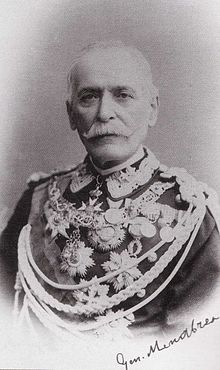Luigi Federico Menabrea
| Luigi Federico Menabrea | |
|---|---|
 |
|
| 7th Prime Minister of Italy | |
|
In office 27 October 1867 – 14 December 1869 |
|
| Monarch | Victor Emmanuel II |
| Preceded by | Urbano Rattazzi |
| Succeeded by | Giovanni Lanza |
| Personal details | |
| Born |
4 September 1809 Chambéry |
| Died | 24 May 1896 (aged 86) Saint-Cassin |
| Political party | Historical Right |
Luigi Federico Menabrea (4 September 1809 – 24 May 1896), later made Count Menabrea and Marquis of Valdora, was an Italian general, statesman and mathematician who served as the Prime Minister of Italy from 1867 to 1869.
Menabrea was born at Chambéry, then part of the Kingdom of Sardinia. He was educated at the University of Turin, where he qualified as an engineer and became a doctor of mathematics. As an officer of engineers he replaced Cavour in 1831 at the fortress of Bard. He then became professor of mechanics and construction at the military academy and at the university of Turin. Among his notable publications: Sketch of the Analytical Engine Invented by Charles Babbage, Esq. with notes by translator Ada Lovelace (1842), which described many aspects of computer architecture and programming. King Charles Albert sent him in 1848 on diplomatic missions to secure the adhesion of Modena and Parma to Sardinia. He entered the Piedmontese parliament, and was attached successively to the Ministries of War and Foreign Affairs.
He belonged to the right centre, and until the events of 1859 he believed in the possibility of a compromise between the Vatican and the state. He was major-general and commander-in-chief of the engineers in the Lombard campaign of 1859. He superintended the siege works against Peschiera, was present at Palestro and Solferino, and repaired the fortifications of some of the northern fortresses. In 1860 he became lieutenant-general and conducted the siege of Gaeta. He was appointed senator and received the title of count.
...
Wikipedia
